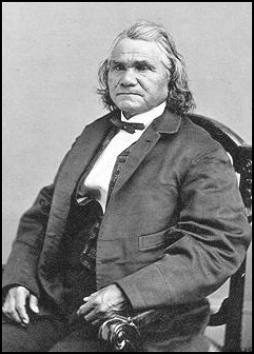 Stand Watie was an influential member of the Cherokee Nation and a Brigadier General of the Confederacy during the Civil War. Born in Rome, Georgia in 1805, he was the younger brother of Elias Boudinot and nephew of Major Ridge. In 1835, Watie, along with his brother and other family members — all part of the “Treaty Party”, signed the Treaty of New Echota. This treaty ceded the Cherokee land to the US and required the Cherokee people to move to Indian Territory (in present day Oklahoma). The majority of the Cherokee Nation did not support the treaty and remained in Georgia to fight for their land while the Treaty Party, and others now known as the Old Settlers, left for Indian Territory. The Cherokee who remained and tried to fight the US through the courts were force to leave in 1838-1839 on what is now known as the Trail of Tears where over 2,000 Cherokees died.
Stand Watie was an influential member of the Cherokee Nation and a Brigadier General of the Confederacy during the Civil War. Born in Rome, Georgia in 1805, he was the younger brother of Elias Boudinot and nephew of Major Ridge. In 1835, Watie, along with his brother and other family members — all part of the “Treaty Party”, signed the Treaty of New Echota. This treaty ceded the Cherokee land to the US and required the Cherokee people to move to Indian Territory (in present day Oklahoma). The majority of the Cherokee Nation did not support the treaty and remained in Georgia to fight for their land while the Treaty Party, and others now known as the Old Settlers, left for Indian Territory. The Cherokee who remained and tried to fight the US through the courts were force to leave in 1838-1839 on what is now known as the Trail of Tears where over 2,000 Cherokees died.
In Indian Territory the two factions of the Cherokees, the Treaty Party and the Ross Party found themselves again at odds. According to Cherokee law, the Treaty of New Echota was unlawful and the selling of Cherokee land without the approval of the people was an act punishable by death. Elias Boudinot, John Ridge, and Major Ridge were all assassinated for their actions. Stand Watie was also marked for death, but was warned and managed to escape. After the killings Watie became the leader of the Treaty Party and led the effort to compromise with the Ross Party. He held a position on the Tribal Council from 1845 to 1861.
The unity of the Cherokee Nation would once again suffer from division as the southern states began to secede from the Union. The Cherokee people were divided on which side to align themselves with but soon entered into an alliance with the Confederate States. Stand Watie was a strong supporter of secession and the Confederacy. In 1861 Watie entered the Confederate Army as a colonel. In 1862, Watie captured a battery of Union guns at the Battle of Pea Ridge and stopped the advance of Union Gen. William Weer into the Indian Territory. In 1863, Watie was elected chief of the Confederate Cherokees, while Ross remained Principle Chief of the Cherokee Nation. In 1864, he became the only Indian to achieve the rank of General when he was promoted to the rank of Brigadier General and led the Second Cherokee Mounted Volunteers. As the war came to a close and the South surrendered, Stand Watie is known to be the last Confederate General to surrender.
Despite the violent and historic chain of events in his life Stand Watie not only survived but also became a leader in the Cherokee Nation and the Confederate Army. He died in 1871.